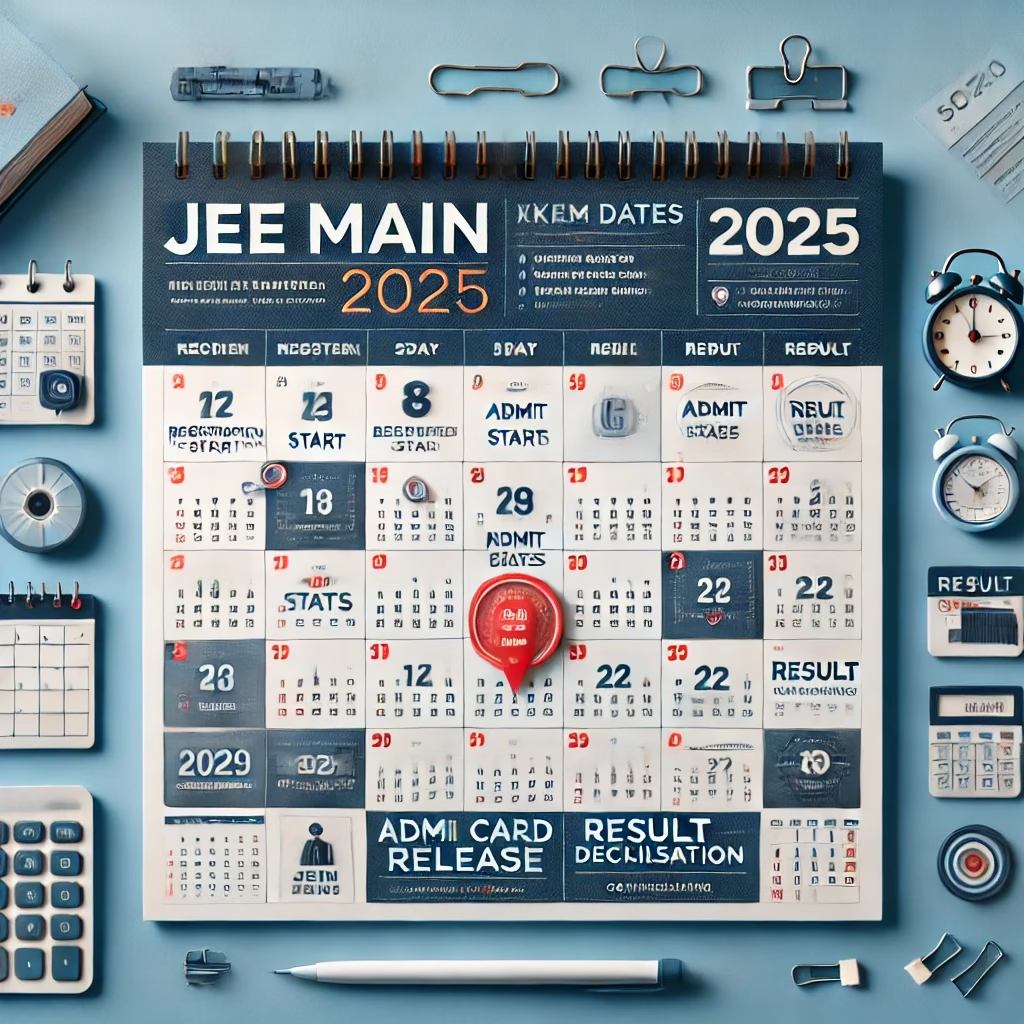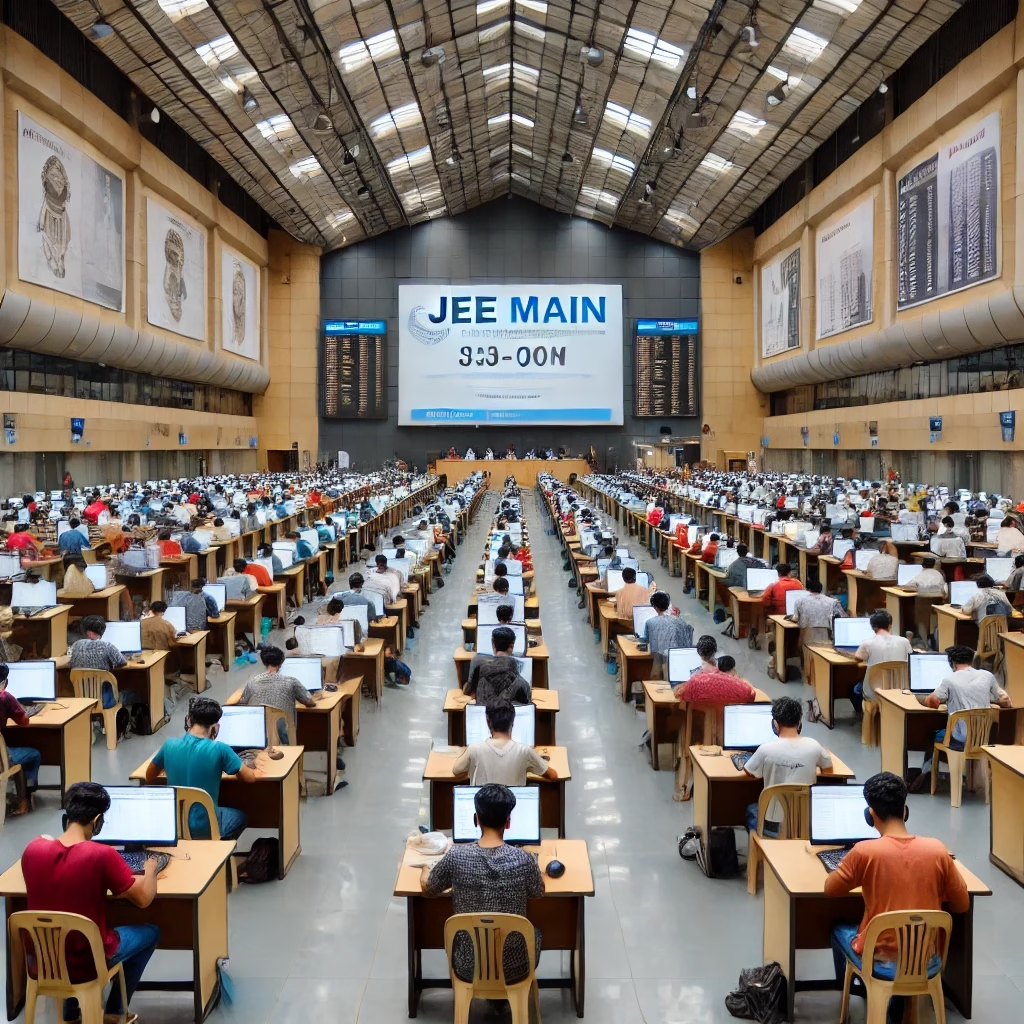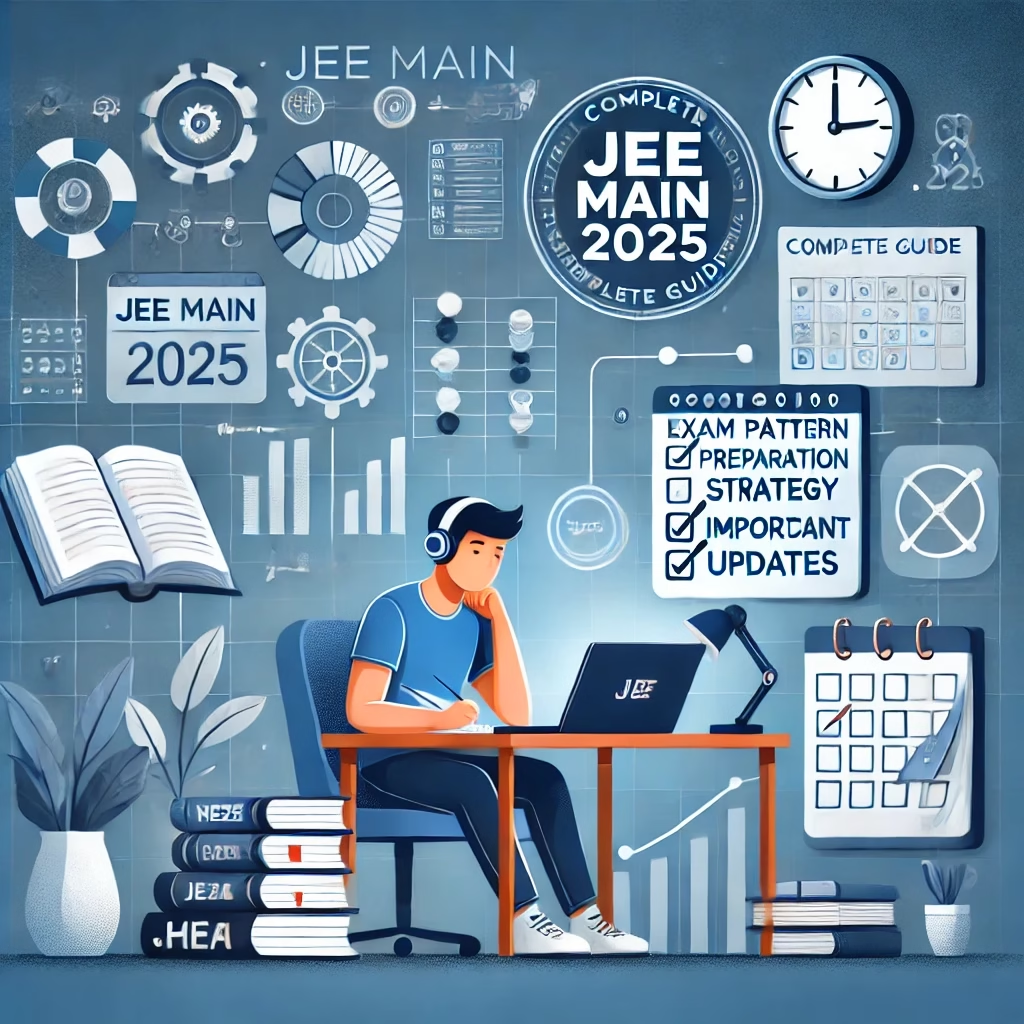The Joint Entrance Examination (Main), popularly known as JEE Main, stands as one of India’s most prestigious and challenging engineering entrance examinations. As the gateway to premier technical institutions like NITs, IIITs, and other Centrally Funded Technical Institutions (CFTIs), JEE Main holds immense significance for engineering aspirants across the country. Additionally, it serves as the qualifying exam for JEE Advanced, which determines admission to the coveted Indian Institutes of Technology (IITs).
With the National Testing Agency (NTA) announcing significant changes to the JEE Main 2025 exam pattern and schedule, it’s crucial for aspirants to stay updated and prepare strategically. This comprehensive guide covers everything you need to know about JEE Main 2025, from exam pattern and eligibility criteria to preparation strategies and expert tips.
What is JEE Main and Why is it Important?
The Joint Entrance Examination (Main) is a standardized test conducted by the National Testing Agency (NTA) for admission to undergraduate engineering and architecture programs at prestigious institutions across India. JEE Main serves as the primary screening test for admission to:
- National Institutes of Technology (NITs)
- Indian Institutes of Information Technology (IIITs)
- Government Funded Technical Institutes (GFTIs)
- Various state-level and private engineering colleges
Additionally, JEE Main serves as the qualifying examination for JEE Advanced, which is the entrance test for the prestigious Indian Institutes of Technology (IITs).
The significance of JEE Main lies in its role as the stepping stone to quality technical education in India. Every year, approximately 10-12 lakh students appear for this examination, making it one of the most competitive exams globally. Success in JEE Main opens doors to prestigious institutions and lays the foundation for a promising career in engineering and technology.
JEE Main 2025 Exam Schedule and Important Dates
The National Testing Agency (NTA) conducts JEE Main twice a year, giving candidates two opportunities to secure a good score. For 2025, the exam will be held in two sessions:
Session 1 (January 2025):
- Examination Dates: January 22, 23, 24, 28, 29, and 30, 2025
- Results Announced: February 11, 2025
Session 2 (April 2025):
- Paper 1 (B.E./B.Tech): April 2, 3, 4, 7, and 8, 2025
- Paper 2 (B.Arch and B.Plan): April 9, 2025
- Results: Expected by the end of April 2025
Other Important Dates for JEE Main 2025 Session 2:
- Application Submission Deadline: February 25, 2025 (9 PM)
- Application Correction Window: February 27-28, 2025
- Admit Card Release: Expected three days before the exam (tentatively March 29, 2025)
- City Intimation Slip: Expected in the third week of March 2025

It’s worth noting that candidates can appear for either one or both sessions, with the best of the two scores being considered for ranking purposes. This dual opportunity allows students to improve their performance and maximize their chances of securing admission to their preferred institutions.
Detailed Exam Pattern for JEE Main 2025
Understanding the JEE Main exam pattern is crucial for effective preparation. The examination comprises three papers:
- Paper 1: For B.E./B.Tech programs
- Paper 2A: For B.Arch programs
- Paper 2B: For B.Planning programs
Let’s look at the detailed pattern for each paper:
Paper 1 (B.E./B.Tech) Pattern:
The exam is conducted as a Computer-Based Test (CBT) with a duration of 3 hours (4 hours for PwD candidates). It includes questions from Physics, Chemistry, and Mathematics.
| Subject | Section A (MCQs) | Section B (Numerical Value) | Total Marks |
|---|---|---|---|
| Physics | 20 questions | 5 questions | 100 |
| Chemistry | 20 questions | 5 questions | 100 |
| Mathematics | 20 questions | 5 questions | 100 |
| Total | 60 questions | 15 questions | 300 |
Important Change for 2025: In Section B, candidates are now required to answer all 5 questions per subject. There is no choice or option to select questions, unlike previous years where candidates could choose 5 out of 10 questions.
Paper 2A (B.Arch) Pattern:
This paper is for candidates seeking admission to B.Arch (Bachelor of Architecture) programs.
| Subject | Type of Questions | Number of Questions | Total Marks |
|---|---|---|---|
| Mathematics | MCQs & Numerical Value | 20 MCQs & 5 Numerical | 100 |
| Aptitude Test | MCQs | 50 questions | 200 |
| Drawing Test | Pen & Paper based | 2 questions | 100 |
| Total | – | 77 questions | 400 |
Paper 2B (B.Planning) Pattern:
This paper is for candidates seeking admission to B.Planning programs.
| Subject | Type of Questions | Number of Questions | Total Marks |
|---|---|---|---|
| Mathematics | MCQs & Numerical Value | 20 MCQs & 5 Numerical | 100 |
| Aptitude Test | MCQs | 50 questions | 200 |
| Planning Based Questions | MCQs | 25 questions | 100 |
| Total | – | 100 questions | 400 |
Marking Scheme:
- For each correct answer: +4 marks
- For each incorrect answer: -1 mark (negative marking)
- Unattempted questions: 0 marks
[Image: Visual representation of JEE Main exam pattern]
Language Options:
JEE Main 2025 will be available in 13 languages:
- English
- Hindi
- Assamese
- Bengali
- Gujarati
- Kannada
- Malayalam
- Marathi
- Odia
- Punjabi
- Tamil
- Telugu
- Urdu
This multilingual approach ensures that candidates can take the exam in their preferred language, reducing language barriers and providing a level playing field.
JEE Main Eligibility Criteria
Before applying for JEE Main 2025, candidates must ensure they meet the eligibility criteria set by the National Testing Agency (NTA). Let’s look at the key eligibility requirements:
Age Limit:
There is no age limit for candidates appearing in JEE Main 2025. However, candidates must satisfy the age requirements of the institute they wish to join.
Educational Qualifications:
- Candidates who have passed their Class 12 examination or equivalent in 2023, 2024, or those appearing in 2025 are eligible to apply.
- For B.E./B.Tech: Candidates must have studied Physics, Chemistry, and Mathematics as compulsory subjects in their qualifying examination.
- For B.Arch: Candidates must have studied Mathematics in their qualifying examination.
- For B.Planning: Candidates must have studied Mathematics in their qualifying examination.
Number of Attempts:
Candidates can attempt JEE Main for three consecutive years from the year of passing their Class 12 examination.
Minimum Percentage Required:
- For appearing in JEE Main: There is no minimum percentage requirement.
- For admission to NITs, IIITs, and CFTIs: Candidates must secure a minimum of 75% marks in their Class 12 examination (65% for SC/ST candidates).
State of Eligibility:
The state of eligibility refers to the state from which the candidate has passed Class 12 or equivalent qualifying examination. This is important for state quota admissions. Some key points:
- It does not depend on the native place or residence of the candidate.
- If a candidate passed Class 12 from one state but appeared for improvement from another state, the state code of eligibility will be from where the candidate first passed Class 12.
- For candidates passing Class 12 from NIOS, the state of eligibility is determined based on the location of the study center.
- For Indian nationals passing Class 12 from Nepal/Bhutan, the state code of eligibility is determined based on their permanent address in India as given in their passport.
[Image: Graphical representation of eligibility criteria for JEE Main]
Meeting these eligibility criteria is mandatory, and candidates who do not fulfill these requirements may have their applications canceled at any stage of the admission process.
JEE Main 2025 Application Process
The application process for JEE Main 2025 is completely online through the official website of the National Testing Agency (NTA). Here’s a step-by-step guide to the application process:
Registration and Application Submission:
- Visit the Official Website: Go to the official JEE Main website (jeemain.nta.nic.in).
- New Registration: Click on the “New Registration” button and create an account using your email ID and mobile number.
- Fill in Personal Details: Enter personal information like name, date of birth, gender, contact details, etc.
- Educational Details: Enter information about your qualifying examination (Class 12).
- Choose Exam Paper(s): Select which paper(s) you wish to appear for – Paper 1 (B.E./B.Tech), Paper 2A (B.Arch), or Paper 2B (B.Planning), or combinations.
- Select Exam Centers: Choose four preferred exam cities.
- Upload Documents: Upload scanned copies of your photograph, signature, and other required documents as per specifications.
- Pay Application Fee: Pay the application fee online using credit/debit card, net banking, UPI, or other available methods.
- Submit Application: Review all details, make corrections if needed, and submit the application.
- Download Confirmation Page: After successful submission, download and print the confirmation page for future reference.
Application Fee:
| Category | Fee for One Paper | Fee for Two Papers | Fee for Three Papers |
|---|---|---|---|
| General/OBC (Male) | ₹1000 | ₹1800 | ₹2600 |
| General/OBC (Female) | ₹800 | ₹1500 | ₹2200 |
| SC/ST/PwD/Transgender | ₹500 | ₹800 | ₹1100 |
Application Correction Window:
The NTA usually provides a window for candidates to correct any errors in their application form. For JEE Main 2025 Session 2, the correction window was open from February 27 to 28, 2025.
[Image: Screenshot of JEE Main application form]
It’s crucial to fill the application form carefully and accurately to avoid any issues later. Double-check all information before submission, especially personal details, choice of exam centers, and uploaded documents.
Comprehensive Preparation Strategy for JEE Main
Preparing for JEE Main requires a structured and disciplined approach. Here’s a comprehensive strategy to help you prepare effectively:
Understanding the Syllabus:
The first step is to thoroughly understand the JEE Main syllabus. The syllabus is primarily based on NCERT curriculum for Class 11 and 12, covering Physics, Chemistry, and Mathematics. Familiarize yourself with the topics and subtopics in each subject to plan your preparation accordingly.
Creating a Study Plan:
Develop a realistic and achievable study plan:
- Allocate time for each subject based on your strengths and weaknesses
- Include daily, weekly, and monthly goals
- Set aside time for revision and practice tests
- Include short breaks to avoid burnout
- Make a daily timetable and devote at least 5-6 hours for JEE Main preparation
Subject-wise Preparation Tips:
Physics:
- Focus on understanding concepts rather than memorizing formulas
- Pay special attention to topics like Mechanics, Electrostatics, and Modern Physics
- Solve numerical problems regularly to build problem-solving skills
- Create a formula sheet for quick revision
- Visualize concepts using diagrams and animations
Chemistry:
- Organic Chemistry: Focus on reaction mechanisms and named reactions
- Inorganic Chemistry: Learn periodic table trends and properties
- Physical Chemistry: Master numerical problem-solving techniques
- Make short notes for each chapter
- Regular revisions are crucial for retention
Mathematics:
- Practice is key – solve as many problems as possible
- Focus on Calculus, Coordinate Geometry, and Algebra
- Learn shortcuts and time-saving techniques
- Create a formula sheet for quick reference
- Work on your calculation speed
Study Resources:
Textbooks:
- NCERT textbooks (mandatory and fundamental)
- HC Verma for Physics
- JD Lee and OP Tandon for Chemistry
- RD Sharma and Cengage for Mathematics
Online Resources:
- Video lectures from platforms like Unacademy, Vedantu, and ALLEN Digital
- Interactive simulations for complex concepts
- Subject-specific apps and websites
- Previous year question papers and solutions
[Image: Study resources recommended for JEE Main preparation]
Time Management Tips:
- Identify your peak productivity hours and schedule challenging topics during those times
- Use the Pomodoro technique (25 minutes of focused study followed by a 5-minute break)
- Avoid multitasking
- Keep track of your progress regularly
- Eliminate distractions, especially social media
Mock Tests and Previous Year Papers:
- Take regular mock tests to assess your preparation
- Analyze your performance to identify strengths and weaknesses
- Solve previous years’ question papers to understand the exam pattern
- Practice time management during mock tests
- Simulate actual exam conditions when taking mock tests
Revision Strategy:
- Regular revision is crucial for retention
- Use short notes, flashcards, and mind maps for quick revision
- Allocate specific time for revision in your study plan
- Focus on weak areas during revision
- Review mistakes from practice tests and learn from them
Tips from JEE Main Toppers
Learning from the experiences of those who have excelled in JEE Main can provide valuable insights. Here are some tips shared by JEE Main toppers:
Consistent Study Routine:
“I maintained a consistent study schedule of 6-8 hours daily, focusing on all three subjects equally. Consistency is more important than studying for long hours irregularly.”
Conceptual Clarity:
“Instead of memorizing formulas, I focused on understanding the concepts. This helped me solve even the most complex problems by applying basic principles.”
Regular Practice:
“I solved at least 50 problems daily across the three subjects. Regular practice helped me improve my speed and accuracy.”
Mock Tests:
“I took a mock test every week and analyzed my performance thoroughly. This helped me identify weak areas and improve my time management skills.”
Balanced Approach:
“I ensured I was giving equal attention to all subjects and topics. It’s easy to focus on your strengths and ignore weaknesses, but JEE Main tests comprehensive knowledge.”
Health and Well-being:
“I maintained a healthy lifestyle with proper sleep, balanced diet, and regular physical exercise. A healthy mind and body are essential for effective studying.”
These tips emphasize the importance of consistency, conceptual understanding, regular practice, and a balanced approach to JEE Main preparation.
Common Mistakes to Avoid During Preparation
Awareness of common pitfalls can help you navigate your preparation journey more effectively. Here are some mistakes to avoid:
Ignoring NCERT Textbooks:
Many students underestimate the importance of NCERT textbooks and directly jump to advanced reference books. NCERT books form the foundation of JEE Main preparation and should not be skipped.
Inconsistent Study Schedule:
Studying in bursts with long gaps in between hampers retention and understanding. Maintain a consistent study routine.
Neglecting Weak Areas:
Focusing only on your strong subjects or topics while neglecting weak areas creates imbalance in your preparation. Address weaknesses proactively.
Excessive Reference Materials:
Using too many books and resources can lead to confusion and information overload. Stick to a few quality resources for each subject.
Skipping Mock Tests:
Not taking enough mock tests leaves you unprepared for the actual exam environment and time constraints. Regular mock tests are crucial for success.
Lack of Revision:
Many students focus on covering the syllabus without adequate revision. Regular revision is essential for long-term retention.
Ignoring Health and Well-being:
Neglecting sleep, proper nutrition, and physical activity can lead to burnout and reduced cognitive function. Balance study with self-care.
Comparison with Peers:
Constantly comparing your progress with others can lead to unnecessary stress and anxiety. Focus on your own journey and improvement.
Being aware of these common mistakes can help you make conscious choices during your preparation journey and avoid potential setbacks.
Last-Minute Preparation Tips
As the exam approaches, here are some effective last-minute strategies to maximize your performance:
Final Revision:
- Focus on revising formulas, concepts, and important points
- Use your short notes, flashcards, and mind maps for quick revision
- Pay special attention to frequently tested topics and high-weightage areas
- Avoid studying new topics at this stage
Mock Test Analysis:
- Take full-length mock tests to build stamina and improve time management
- Analyze your performance to identify last-minute improvement areas
- Focus on eliminating careless mistakes
- Practice with the same timing and conditions as the actual exam
Time Management Strategy:
- Develop a clear strategy for managing time during the exam
- Decide how much time to allocate to each section based on your strengths
- Practice quick answering techniques for easier questions
- Plan your approach for numerical value questions
Mental Preparation:
- Maintain a positive mindset and confidence
- Practice relaxation techniques like deep breathing and meditation
- Ensure adequate sleep in the days leading up to the exam
- Visualize success and stay motivated
Physical Preparation:
- Maintain a healthy diet and stay hydrated
- Ensure 7-8 hours of sleep daily, especially the night before the exam
- Avoid drastic changes in your routine
- Take short breaks and light physical activity to stay refreshed
Remember, the key to last-minute preparation is consolidation, not acquisition of new knowledge. Focus on strengthening what you already know rather than attempting to learn new concepts.
On the Exam Day: What to Expect and How to Perform
The D-day is finally here. Here’s what to expect and how to maximize your performance on the exam day:
Before Leaving Home:
- Check your admit card and ensure all details are correct
- Carry valid photo ID proof
- Reach the exam center at least an hour before the scheduled time
- Carry only the essentials permitted in the exam hall
- Have a light, nutritious meal before leaving
At the Exam Center:
- Follow all instructions given by the invigilators
- Familiarize yourself with the computer system and interface during the mock drill
- Read all instructions carefully before starting the exam
- Check if all pages and questions are properly displayed
During the Exam:
- Read each question carefully before answering
- For MCQs, eliminate obviously incorrect options to increase chances of selecting the correct answer
- For numerical value questions, double-check your calculations
- Manage your time effectively – don’t spend too much time on any single question
- Mark difficult questions for review and return to them later if time permits
- Avoid random guessing due to negative marking
Time Management in the Exam:
- First 10 minutes: Read instructions and get comfortable with the interface
- Next 50 minutes: Attempt easy questions across all subjects
- Middle 1 hour: Focus on moderately difficult questions
- Last 1 hour: Tackle difficult questions and review marked questions

Remember, staying calm and focused during the exam is as important as the preparation itself. Trust your preparation and approach the exam with confidence.
After the Exam: Result Process and Admission Procedure
Once the JEE Main exam is over, here’s what follows:
Result Process:
- Answer Keys Release: NTA releases provisional answer keys on the official website
- Objection Window: Candidates can challenge the answer keys by paying a fee per question
- Final Answer Keys: After reviewing challenges, final answer keys are published
- Result Declaration: Results are announced with percentile scores
- Rank List: All India Rank (AIR) and category-specific ranks are assigned
Understanding JEE Main Score:
- Raw Score: Marks obtained in the exam based on the marking scheme
- Normalized Score: Raw scores are normalized if the exam is conducted in multiple sessions
- Percentile Score: Indicates the percentage of candidates who scored equal to or below you
- All India Rank (AIR): Determines your position among all candidates nationwide
JEE Advanced Qualification:
- Top 2,50,000 candidates from JEE Main qualify for JEE Advanced
- Category-wise cut-offs are applied for qualification
- Qualified candidates need to register separately for JEE Advanced
Counseling and Admission Process:
- Joint Seat Allocation Authority (JoSAA) conducts counseling for IITs, NITs, IIITs, and GFTIs
- Multiple rounds of seat allocation are conducted
- Candidates need to register for JoSAA counseling, fill in their preferences, and pay the required fee
- Seat allocation is based on All India Rank, category, and preferences
- Document verification is conducted at reporting centers
Understanding the post-exam process helps candidates make informed decisions about their preferences and increases the chances of securing admission to their desired institution.
FAQs about JEE Main
Here are answers to some frequently asked questions about JEE Main:
Q1: How many attempts are allowed for JEE Main?
A: Candidates can attempt JEE Main for three consecutive years from the year of passing their Class 12 examination.
Q2: Is there any age limit for JEE Main?
A: No, there is no age limit for appearing in JEE Main. However, candidates must satisfy the age requirements of the institute they wish to join.
Q3: Can I appear for both sessions of JEE Main?
A: Yes, candidates can appear for either one or both sessions. The best of the two scores will be considered for ranking.
Q4: Is there negative marking in JEE Main?
A: Yes, there is negative marking. For each incorrect answer, one mark is deducted. There is no negative marking for unattempted questions.
Q5: How is the JEE Main rank calculated?
A: JEE Main rank is calculated based on the normalized percentile score. If a candidate appears for both sessions, the best of the two scores is considered.
Q6: What is the minimum percentage required in Class 12 for JEE Main?
A: There is no minimum percentage requirement for appearing in JEE Main. However, for admission to NITs, IIITs, and CFTIs, candidates need to secure at least 75% marks (65% for SC/ST) in their Class 12 examination.
Q7: Can I change my exam center after submitting the application?
A: Generally, changing the exam center is not permitted after the application form is submitted. However, in exceptional circumstances, NTA may consider requests for exam center changes.
Q8: What happens if there is a technical issue during the computer-based test?
A: In case of technical issues, candidates should immediately inform the invigilator. Extra time will be provided to compensate for the time lost due to technical problems.
Q9: How do I prepare for the drawing section in Paper 2A (B.Arch)?
A: Practice sketching and drawing regularly. Focus on perspective drawing, three-dimensional compositions, and architectural awareness. Refer to previous years’ questions to understand the pattern.
Q10: Is NCERT sufficient for JEE Main preparation?
A: NCERT textbooks provide a strong foundation but may not be sufficient for comprehensive JEE Main preparation. Supplement NCERT with standard reference books and practice materials to cover the depth required for JEE Main.
Conclusion

JEE Main is not just an exam; it’s a journey that tests your knowledge, perseverance, and time management skills. Success in JEE Main opens doors to premier technical institutions and lays the foundation for a promising career in engineering and technology.
The key to cracking JEE Main lies in understanding the exam pattern, strategic preparation, consistent practice, and a balanced approach. By following the strategies and tips outlined in this guide, you can navigate your JEE Main 2025 preparation journey with confidence and clarity.
Remember, JEE Main is highly competitive, but with the right approach, dedication, and perseverance, success is achievable. Stay focused, maintain a positive mindset, and give your best. Every step you take towards your goal counts, regardless of the final outcome.
Best wishes for your JEE Main 2025 preparation and exam!
Read more at worldsinsight.











